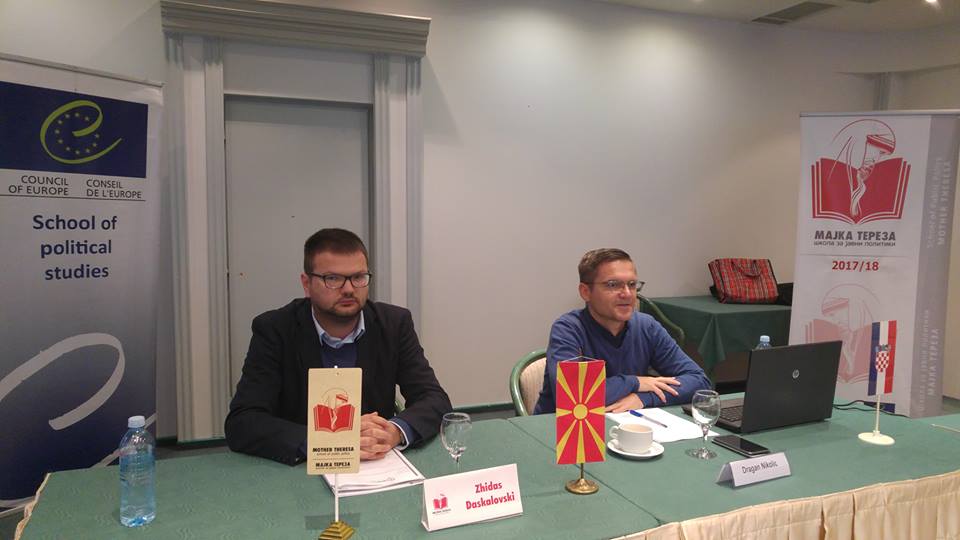Second Session of School of Public Policy Mother Teresa (generation 2017/8)
October 6-8, 2017, Hotel Metropol, Ohrid
Democratic challenges to the Balkan region and Public Policy
Introduction
This seminar was related to the general topic of the School of Public Policy as it aimed to improve the knowledge of the participants in the field of public policy and in particular in the area of policy research and analysis taking into consideration current issues in the neighboring countries. The seminar took place in Ohrid in the hotel Metropol during the weekend 6-8th October, 2017. Additional program was held on the 5th October, 2017 in Skopje in hotel Porta. All the participants from the generation 2017/8 were invited. We had seven absentees due to different reasons, some personal (wedding, pregnancy, sickness, etc.) some related to activities within the electoral campaign ongoing in Macedonia. Local elections are to be held the weekend of 15th of October. Six experts from the region were invited to give lectures and discuss public policies and democratic challenges facing the Western Balkans today with the participants. This seminar helped our participants to improve their knowledge and techniques in policy research and analysis taking into considerations current issues in the Western Balkan region.
Detailed Program with Pictures of the Lecturers and Participants
Friday (06.10.2017)
18:00 – 19:30
Introduction to the Seminar, Prof. Zhidas Daskalovski, followed by:
Serbian Experiences to the Democratic challenges to the Balkan region and Public Policy
Lecturer: Stevan Gajic, Ph.D.
19:30-20:30 Dinner
Saturday (07.10.2017)
9:00-10.30
Breakfast
10:30 – 12:00
Croatian Experiences to the Democratic challenges to the Balkan region and Public Policy
Lecturer: Dragan Nikolic
12:00-12:30
Coffee Break
12:30- 14:00
Turkey and the Democratic challenges to the Balkan region and Public Policy
Prof. Inan Ruma
14:00 – 15:30
Lunch
15:30-16:30
Free time
16:30-18:00
Kosovo and Democratic challenges to the Balkan region and Public Policy
Lecturer: Ramadan Ilazi
18:30-20:00
Albania and Democratic challenges to the Balkan region and Public Policy
Erjon Tase
20:00-
End of Day 2, Dinner and Free time
Sunday (08.10.2017)
9:00-10:30
Breakfast
10:30-12:00
Bulgaria and Democratic challenges to the Balkan region and Public Policy
Lecturer: Plamen Dimitrov Petrov
12:00-12:30
Coffee Break
12:30-14:00
Prof. Zhidas Daskalovski
Discussion of the Council of Europe report on Populism and the progress made regarding the assignments for policy research and analysis in 2017/8.
14:00-15:30
Lunch
15:30-16:00
Evaluations
End of the Seminar and departure
Table: Evaluation of the Seminar by Participants
| Item | Evaluation (1-5) |
| Are you satisfied with the topic of the seminar | 100% yes |
| Please give grade to the topic of the seminar | 5.00 |
| Grade for Lecturer Stevan Gajic | 4.93 |
| The lecture of Gajic… | Contributed a good discussion to develop |
| Grade for Lecturer Dragan Nikolic | 5.00 |
| The lecture of Nikolic…. | Gave me new insights to the topic |
| Grade for Lecturer Inan Ruma | 4.85 |
| The lecture of Inan Ruma…. | Gave me new insights to the topic |
| Grade for Lecturer Plamen Dimitrov Petrov | 4.21 |
| The lecture of Petrov… | Gave me new insights to the topic |
| Grade for Lecturer Ramadan Ilazi | 3.71 |
| The lecture of Ilazi… | Did introduce knowledge I am familiar with |
| Grade for Lecturer Erjon Tase | 4.50 |
| The lecture of Tase… | Gave me new insights to the topic |
Biographies of speakers:
Mr. Dragan Nikolić, HRT, Foreign Affairs Correspondent (Croatia), alumnus of the Croatian School of CoE (Academy for Political Development)
Mr. Erjon Tase, executive director of Academy of Political Studies. Mr. Tase was a participant of the School’s programme in 2008 and later has contributed also for the coordination of the ASPS alumni network. He is in position as Executive Director from May 2012. Erjon is a very experienced journalist and opinion maker in Albania. He has worked as an editor and editor in chief for more than 10 years in the most prominent printed media, as the daily “Gazeta Shqiptare” and the weekly magazine “Klan”. He is widely regarded as an independent and balanced journalist and civil activist. Over the last years he has been engaged also in the marketing campaigns for private business and public relations sector. Since 2007 he is member of founding and steering board of the “Union of Albanian Journalists”. Erjon also is member of founding and steering board of the “Forum for Protection of Cultural and Historical Heritage.”
Plamen Dimitrov, PhD, is a Board Member of Bulgarian Geopolitical Society, Member of the Editorial Board of “Geopolitics” magazine, Chairman of the Board of Armed Forces and Civil Society Foundation. Between 2012 and 2014 Plamen Dimitrov was a visiting lecturer in International Relations at Eurasian National University in Astana, Kazakhstan; in 2016 he was a visiting research fellow at the Center for Strategic Studies under the President of Azerbaijan. He is an author of many scientific articles and political analyses in the media. He has been a lecturer at Sofia University and the Diplomatic Institute of the Bulgarian Ministry of Foreign Affairs.
Stevan Gajić, PhD, graduated in politics in 2008 at the University of Belgrade. He was an exchange student at the University of Wisconsin, University of Wisconsin (Eau Claire). He attended the Belgrade Open School. At the School of Slavonic and East European Studies, University College London, in 2009, he completed MA in Central and East European Studies. At the Central European University in Budapest, he completed the 2010 MA Nationalism Studies. He did his PhD at the Faculty of Political Sciences in Belgrade in 2016, with the dissertation “Two views of the future of African Americans in the United States – Frederick Douglas and William De Boys.
Ramadan Ilazi has been Deputy Minister for European Integration of Kosovo as of January 30th 2015. His portfolio includes: strengthening dialogue and cooperation between the government and civil society in the European integration agenda, supporting the development of a National Action Plan for the Adoption of Acquis and coordinating the efforts of the government of Kosovo to promote open data. In 2014, he briefly served as an adviser to former Prime Minister Hashim Thaçi. Prior to becoming involved in politics he was an active member of civil society in Kosovo, serving as executive director of the Kosovo Institute of Peace from 2012 to 2014 and of Lëvizja FOL from 2008 to 2011. In 2012, he coauthored the paper “A Peace Treaty for Sustainable Peace: a new beginning for Kosovo and Serbia” which outlined a concrete platform for a peace treaty between Kosovo and Serbia. Mr Ilazi has also taught courses on peace and conflict studies in educational institutions in Kosovo and has spoken at a number of international and regional events on issues concerning European integration and good governance. He holds an MA from the University of St. Andrews School of International Relations.
Prof. İnan Rüma, Assistant Professor at the Faculty of Social Sciences and Humanities / Department of International Relations, Bilgi University, Turkey. He earned both his Master of Science and PhD degrees in International Relations at the Department of International Relations of the Middle East Technical University in Ankara, where he was also employed as a research assistant. From September to October 2002 he worked as an International Trainer at the Organisation for Security and Cooperation in Europe (OSCE) Mission in Kosovo (OMIK) for the 26 October 2002 Municipal Elections. He also served as an OMIK Voter Services Supervisor during the same elections. During the preparation for the 17 November 2001 Elections in Kosovo, Ruma also worked as Voter Services Supervisor, Special Needs Voting Supervisor and Polling Supervisor for OMIK. Hismajor areas of interest are: politics in Central and Eastern Europe and the Balkans, international organisations, peacekeeping, and theories of international relations and political sociology.






